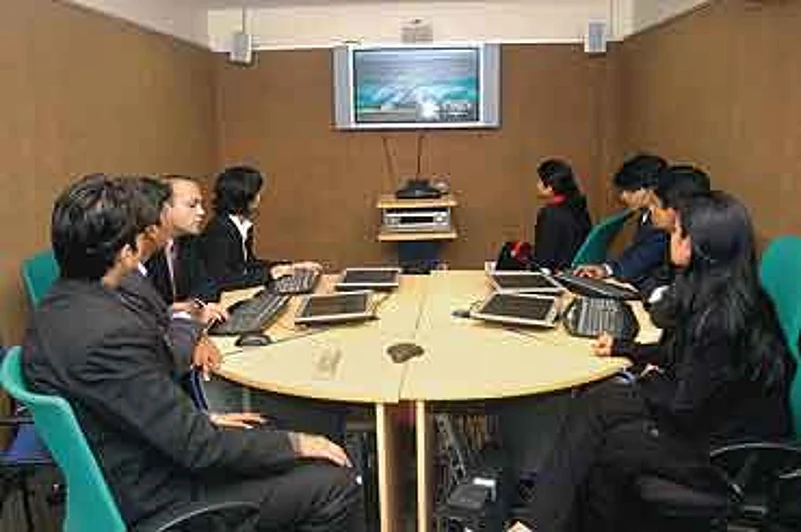So, Damodaran enrolled in an MBA programme at IIM, Calcutta, which allowed him to keep his job, while attending lectures daily. Even better, he doesn’t need to be at the hallowed IIM campus. In fact, his classes are held at a 30-seater call centre-like place in Delhi’s Connaught Place and he gets to interact with the best teachers from IIM-C. Thanks to information technology and satellite communication, a management course from premier institutes like XLRI, NMIMS, IIFT or the IIMS can now be pursued in most of the country’s major cities and at significantly lower costs than on-campus programmes.
Long considered the domain of the not-so-bright students, long-distance courses are a boon for executives, whose busy schedules in sectors like financial services, IT, and legal services are forcing them to embrace the new concept. Hughes Escorts Communications Ltd (HECL), one of the first to roll out a franchisee model for management education, provides the technology platform, Direcway, and the marketing support for more than a dozen leading institutes to conduct IT-enabled long-distance courses. The interactive onsite learning (IOL) programmes allow students to go to contact centres after office hours and attend lectures that are webcast live. With an application similar to the internet messenger, the students can send in their queries to the lecturers, and interact with fellow students in real time.
Unlike other e-learning or distance learning offerings, in these programmes, the interactivity is similar to a live classroom session, where a student sitting in any part of the country can interact freely with the professor, ask questions, and get answers instantly. This makes the interaction spontaneous and natural just like a regular classroom. What makes it work is the superior satellite and technology platform that provides one-way video and two-way audio facilities to students.
Thus, in IOL, a student participates in the learning process and receives individual attention even when the instructor and student are in different places. "We have bridged the quality gap between on-campus and distance learning courses through technology. With IOL, the benefits of a real-time, classroom-like interaction between students and teachers is retained while offering the former the flexibility to choose their timings," says HECL vice-president Srikant Acharya.
According to IIM Bangalore, which offers a clutch of long-distance programmes, the course content is similar to the on-campus ones. If anything, the distance programme is more streamlined keeping in mind the students’ time constraints. A one-year conventional general MBA, which could cost anywhere up to Rs 2.5 lakh at the IIMs, is available on this platform for just Rs 1.8 lakh. And it comes with a promise of 300 hours of live classroom sessions. "It’s the next best thing to the traditional method of doing anMBA course," says Damodaran.
Not surprisingly, the market for such courses is growing at over 50 per cent per annum. Within three years of its commencement,HECL claims that nearly 4,500 students have taken up courses on its platform, earning the company Rs 25 crore last fiscal. It has 48 centres in 32 cities, and has eight studios, each located near the institutes offering the courses.
Also jumping on to the IT-enabled education bandwagon is the Xavier Institute of Management, Bhubaneshwar, which has tied up with another broadband service provider, Reliance Infocomm, to use the latter’s chain of Reliance Webworlds as the contact class rooms. Starting October this year, the institute is beginning a one-year course. "We found a tremendous potential for providing management education to mid-level executives. We were flooded with requests from corporates to run it," says B. Ganesh, head of the technology-enabled learning programmes at XIMB.
Ganesh adds that the XIMB’s course would focus on practical learning, rather than on theoretical issues. After the completion of the course—which will cost Rs 1.5 lakh—the institute offers the students an option to pursue a six-month on-campus specialisation in marketing, finance or IT. "There is no qualitative difference between the regular and the IT-enabled course. The certificate we’ll give at the end of the course wouldn’t even say that the student has undergone a long-distance programme. Students passing out of this course would be eligible to call themselves XIM alumni and be free to tap the alumni network," he explains.
Many students who have taken such courses agree. Mumbai-based Indranil Ghosh, a vice-president with the TV production house UTV, took a one-year executive MBA course with a specialisation in financial management at HECL, offered by the Manipal Academy of Higher Education. The UGC-recognised degree, Ghosh reasoned, would open greater opportunities for him in the fast-growing financial services sector. But it is already paying him dividends in his current job.
"A sound knowledge of finance has helped me run my two divisions better. For instance, I could negotiate better while recently raising a term loan of over Rs 10 crore for a business division," he says. "HECL’s delivery mechanism was so good, nobody in our batch felt we were doing a long-distance course. The intensity of a classroom atmosphere was very much there," he adds.

The methodology followed for the various programmes offered through Direcway is a blend of real-time lectures, theme presentations and case studies. In order to make the learning effective, frequent online quizzes and tutorial sessions form a part of the instruction. Depending on the programme on offer and the B-School, students get their reading material in advance of the online lessons.
To compensate for the lack of normal campus back-up systems, students get memberships in the British Council Library and theUSIS library in their cities. Additionally, a backend learning management system provides the opportunity for self- or instructor-led offline learning. The classroom lectures are supplemented by expert lectures and cd-rom copies of some lectures are made available if one needs a repeat session.
Such initiatives taken by HECL—and the ones proposed by XIMB—will revolutionise distance learning which, earlier, meant loads of printed course material and mailed assignments. "Today, a distance learner lives in a city and downloads his course content from the internet, enjoys a world of options at the press of a button, and interacts with fellow students using videoconferencing, threaded discussions and bulletin boards," says Acharya of HECL. The student can also work while pursuing his studies. As one of the student puts it, "It’s the best of both worlds."
The only thing that’s lacking is that the long-distance courses are not as yet recognised by the AICTE (All India Council for Technical Education), the regulator for B-schools. But most experts feel that it’s a matter of time before it happens, especially since reputed colleges are following the model.And this has already become an important aspect of higher education in the developedcountries.In fact, HECL is so excited by the future prospects that it wants to use the same technology to offer technical and engineering courses. Long-distance learning is a concept whose time seems to have come.


























